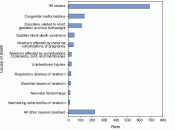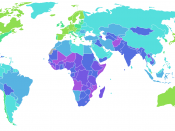Medical Technology and the Controversies of Prolonging LifeIn 1900, the average life expectancy was 47 years, by 1998 life expectancy had risen to 76.7 years (Kleespies, P., 2004). Prior to the advent of Penicillin, pneumonia carried a mortality rate of 30%, Penicillin lowered this to 6%. (Leach, J., 2005). Infant mortality rates have fallen from 16.5 per 100 in 1900 to 0.77 per 100 in 1997. Many of the childhood diseases which took young lives have been nearly eradicated (Public Broadcasting System, 2009). The rate of deaths due to cardiovascular disease has decreased 41% in less than 50 years (National Institutes of Health, 2009). End stage renal disease is fatal within months, but with dialysis, patients can live another 5 to 10 years (Merck, 2009). Clearly, medical technology has given countless patients and their families many years together.
Medical care is expensive and not universally available. Some believe this to be reason enough to demand high-tech care be withheld from patients in situations where quality of life may be considered poor or when care may prove futile.
The ethical issues which arise from this line of thinking are many. Whose criteria will be used to define quality of life? Autonomy is a cornerstone of healthcare ethics (Edge & Groves, 2005), How healthcare professionals justify denying choice to patients? According to Smith (2006), German physician Christopher W. Hufeland wrote in 1806, "It is not up to (the doctor) whether â¦.life is happy or unhappy, worthwhile or not, and should he incorporate these perspectives into his trade. . . the doctor could well become the most dangerous person in the state."By setting limits on whom will receive aggressive medical care, many patients will be robbed of happy and productive years. Additionally, the medical community will be breaching their own code of ethics.


